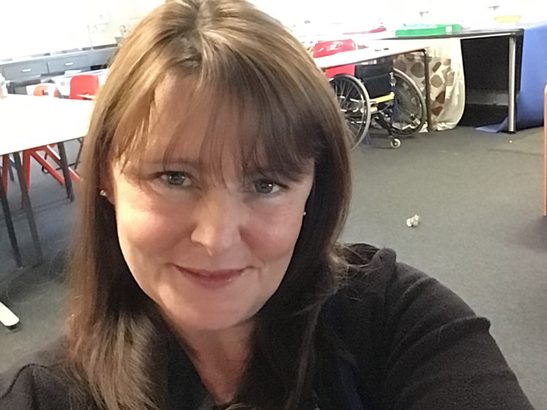The latest in our series of profiles of educators, researchers and students - sharing what it is about a Froebelian approach to early childhood education that inspires them in their work today.
Andrea McDonald is a teacher in a Glasgow secondary school for pupils (aged 11 to 18) who have a wide range of complex learning needs including Autism. She shares what it is about a Froebelian approach that has inspired her in her teaching work.
Q: What's your role in the secondary school where you work?
My main job is to plan and implement an appropriate curricular pathway and learning environment for children who find learning a challenge due to their significant complex learning needs.
My recent work has involved learning about Froebelian principles and incorporating them into a suitable learning environment which encourages our learners to become more autonomous and equipped for life post school.
Since learning about Froebel in 2019, I have been piloting an approach which is loosely based on providing a learning environment influenced by Froebelian approaches and principles.
I have used my studies to create an indoor and outdoor classroom which meets the needs of complex learners. I regularly gather data and keep a journal of successes and challenges to date. The success of this pilot has influenced how others in the school provide more diverse learning experiences.
Q: Tell us about your training and career journey so far...
I began my teaching career in 1997, graduating with an Honour’s Degree in Primary Education from Strathclyde University. I subsequently studied at the University of Glasgow and completed a Diploma in Support for Learning in 2004, some Chartered Teacher modules in 2006-2008, PGCE in Middle Leadership and Management in 2018 and finally the certificate in Froebel and Childhood Studies at the University of Edinburgh in 2019. I have provided an education for learners who have a vast range of additional support needs for 24 years.
Q: When and how did you first come across the work and principles of Froebel?
I only learned about the principles and work of Froebel when I embarked on the Froebel and Childhood Course at University of Edinburgh in 2019. My headteacher and I decided that an alternative pathway needed to be created for learners who have complex needs. My headteacher suggested I embark on the course, which I did enthusiastically. It is one of the most informative and worthwhile courses I have had the pleasure of being part of. It will continue to influence how I work and engage with children from now on.
Q: How do you try to use a Froebelian approach in your work with children now?
Many students who have complex learning needs have difficulty in accessing learning and teaching in the traditional, formal ways and are often functioning at developmental levels significantly lower than their chronological age. Their post school destinations have also changed over the years. Most of these students, when they leave school, will go on to supported living accommodation and will be required to communicate their needs, use appropriate social skills and carry out some activities as independently as they can.
Looking at what the 21st century learner with a complex learning difficulty required for life post school and taking what I had learned about Froebel, a semiformal, holistic and child-centred environment was created, encompassing the main Froebelian principles.
Activities were set in a nurturing environment and included: cooking and eating together, sensory play, games, art/clay modelling, role-play, construction and music. The outdoor garden had opportunities for gardening, exploring nature, movement, sensory exploration and endless opportunities for learning.
All activities encouraged development of communication, independence, autonomy and decision-making. The provision of rich, meaningful, indoor and outdoor, learning experiences would prepare our cohort of young people for living post-school.
Interested in further Froebelian study?
Courses, training and resources for teachers and educators
Find out moreLooking at what the 21st century learner with a complex learning difficulty required for life post school... a semiformal, holistic and child-centred environment was created, encompassing the main Froebelian principles.
Finding Froebel
Profiles of educators, researchers and students - sharing what it is about a Froebelian approach to early childhood education that inspires them in their work.
Learn more

